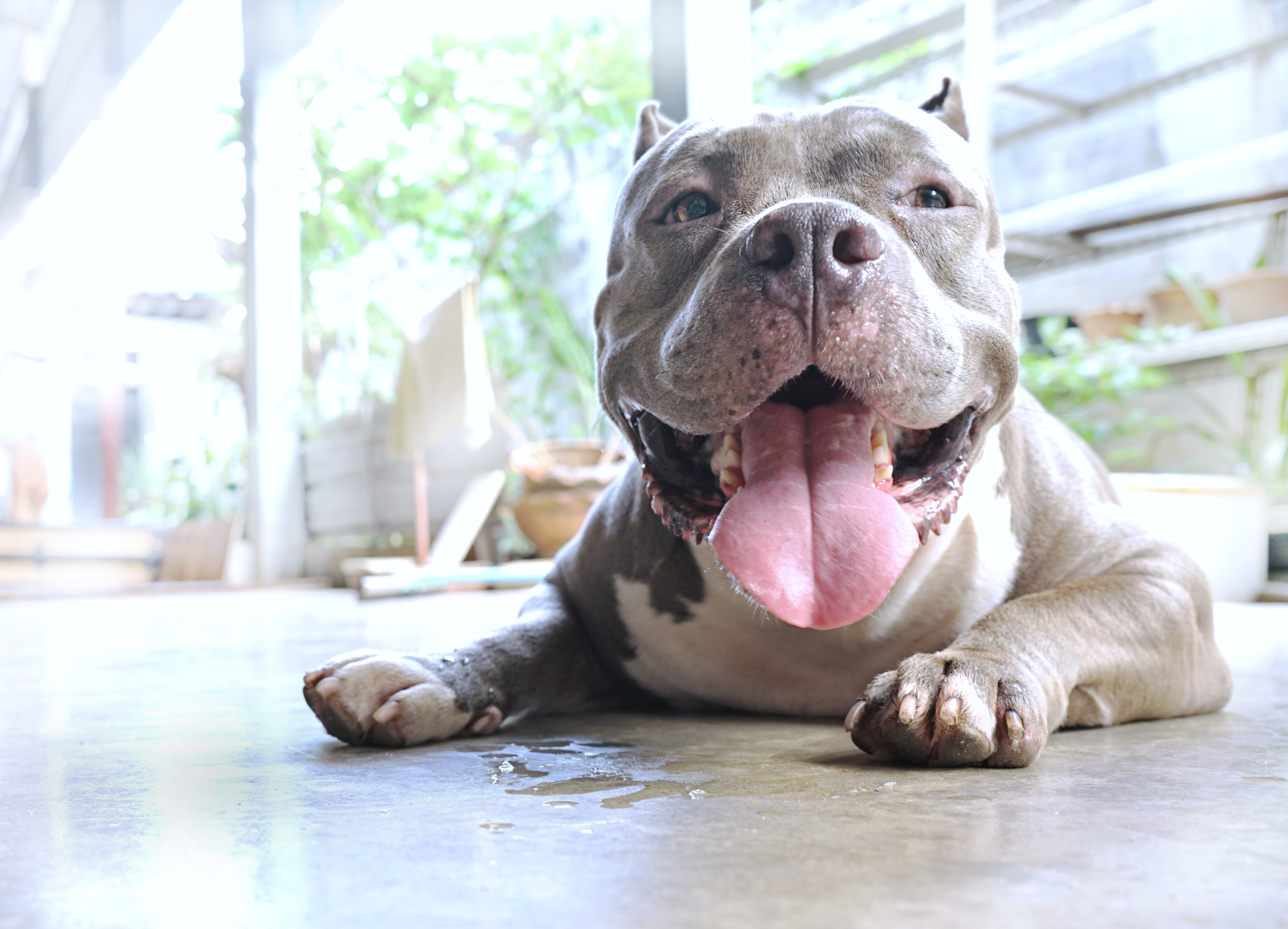Did you know that the age at which a pitbull can get pregnant is surprisingly young? Unlike other dog breeds, pitbulls can reach sexual maturity as early as six months old. This means that they can potentially become pregnant and have puppies at a very young age, which highlights the importance of responsible pet ownership and proper care for these energetic and lovable dogs.
Understanding the reproductive cycle of pitbulls is essential for owners. On average, female pitbulls go into heat, or estrus, approximately twice a year. This typically occurs around six to ten months of age and can last for two to three weeks. During this time, they may exhibit behavioral changes and attract male dogs, so it’s important to keep them securely contained or closely supervised. Spaying or neutering your pitbull is a highly effective solution to prevent unwanted pregnancies and potential health issues, while also contributing to the overall population control of this beloved breed.
Wondering when pitbulls can get pregnant? Pitbulls typically reach sexual maturity between 6 to 12 months of age. However, it’s recommended to wait until they are at least 2 years old before breeding them. This allows for proper physical and emotional development, ensuring a healthier outcome for both the mother and the puppies. It’s important to consult with a veterinarian for guidance on the best time to breed your pitbull and to ensure a safe and successful pregnancy.

When Can Pitbull Get Pregnant?
Pitbulls are popular breed dogs known for their strength, loyalty, and affectionate nature. If you own or plan to own a pitbull, it’s essential to understand their reproductive cycle and know when they can get pregnant. This article will provide you with in-depth information about the breeding season, estrus cycle, and signs of pregnancy in pitbulls. Whether you’re a breeder or a pet owner, having this knowledge will help you make informed decisions about your pitbull’s reproductive health.
The Breeding Season: When Are Pitbulls Most Fertile?
Pitbulls, like many other dog breeds, have a specific breeding season during which they are most fertile. The breeding season for pitbulls typically occurs twice a year, in the spring and fall. During this time, female pitbulls, also known as bitches, go into heat and become receptive to mating. The duration of the breeding season can vary slightly among individuals, but it generally lasts for about three weeks.
It’s essential to note that pitbulls are generally not considered fully mature until they reach two years of age. Breeding a pitbull before this age can result in health problems for both the mother and her offspring. Therefore, it’s advisable to wait until your female pitbull is at least two years old before considering breeding her.
During the breeding season, male pitbulls, or studs, release pheromones that attract females in heat. If you’re a breeder, this is the ideal time to introduce your female pitbull to a suitable stud for mating. However, it’s crucial to follow responsible breeding practices and ensure proper care for both the sire and the dam to maintain the health and well-being of the resulting puppies.
Understanding the Estrus Cycle in Pitbulls
The estrus cycle, also known as the heat cycle, plays a vital role in determining when a female pitbull can get pregnant. This cycle consists of four distinct stages: proestrus, estrus, diestrus, and anestrus. Let’s take a closer look at each stage:
- Proestrus: This is the first stage of the estrus cycle and typically lasts for about 7 to 10 days. During this time, the female pitbull experiences a swollen vulva, vaginal bleeding, and an increase in estrogen levels. However, she is not yet ready to mate.
- Estrus: The estrus stage usually follows proestrus and lasts for approximately 7 to 10 days. This is the period when the female is fertile and receptive to male dogs. It’s important to closely monitor your pitbull during this stage if you’re trying to breed her.
- Diestrus: Diestrus is a relatively short stage that lasts for about 60 to 90 days. At this point, the female pitbull is no longer receptive to mating and her reproductive system undergoes changes in preparation for pregnancy. If fertilization doesn’t occur, the diestrus stage ends, and the cycle restarts.
- Anestrus: Anestrus is the stage when the female pitbull’s reproductive system is at rest. It can last for several months and serves as a recovery period before the next breeding season begins.
Understanding the different stages of the estrus cycle in pitbulls is crucial for determining the ideal time for breeding. It’s recommended to consult with a veterinarian who specializes in canine reproduction to ensure you have accurate information and support throughout the reproductive process.
Signs of Pregnancy in Pitbulls
If your female pitbull successfully mates during her heat cycle, there is a chance that she may become pregnant. It’s important to be aware of the signs of pregnancy in pitbulls to provide appropriate care and make necessary preparations. Here are some common signs to look out for:
- Changes in appetite: A pregnant pitbull may experience changes in her eating habits. Some may have an increased appetite, while others may become more selective about their food.
- Weight gain: As the pregnancy progresses, the pitbull’s abdomen will gradually increase in size due to the growing puppies.
- Behavioral changes: Pregnant pitbulls may exhibit changes in behavior, such as being more affectionate or seeking additional attention.
- Nesting behavior: In preparation for delivery, a pregnant pitbull may start showing nesting behavior by seeking a quiet and comfortable space to give birth.
- Mammary gland development: The pitbull’s mammary glands may become enlarged and start producing milk as the pregnancy progresses.
If you notice any of these signs in your pitbull and suspect she may be pregnant, it’s crucial to consult with a veterinarian for confirmation and guidance. Regular veterinary check-ups throughout the pregnancy are essential to monitor the health of the mother and her developing puppies.
Additional Information on Pitbull Pregnancy
Now that we have covered the basics of when pitbulls can get pregnant, let’s dive deeper into some additional important information:
Reproductive Health Benefits of Spaying and Neutering
While breeding pitbulls can be a rewarding experience, it’s important to consider the potential health benefits of spaying and neutering your dogs. Spaying female pitbulls not only prevents unwanted pregnancies but also eliminates the risk of certain reproductive diseases such as uterine infections and mammary tumors. Neutering male pitbulls reduces the risk of testicular cancer and can help prevent aggressive behavior. It’s essential to discuss the advantages and disadvantages of spaying or neutering with your veterinarian to make an informed decision for your pitbull’s long-term health.
Caring for a Pregnant Pitbull
Once your pitbull is confirmed to be pregnant, it’s crucial to provide her with proper care and support. Here are some tips to ensure a healthy pregnancy:
- Nutrition: Feed your pregnant pitbull a high-quality, balanced diet that is appropriate for her stage of pregnancy. Consult with your veterinarian to determine the best feeding plan.
- Exercise: Moderate exercise is beneficial for pregnant pitbulls, but avoid vigorous activities or strenuous exercise that can put unnecessary stress on her body.
- Medical check-ups: Regular check-ups with your veterinarian are essential during pregnancy to monitor the progress of the mother and the puppies, and address any potential complications.
- Comfortable environment: Provide a comfortable and quiet space for your pregnant pitbull to rest and prepare for delivery. Consider setting up a whelping box where she can safely give birth.
- Preparation for delivery: Familiarize yourself with the signs of imminent delivery and have a plan in place for assisting your pitbull during the labor process, if necessary. It’s also helpful to have an emergency contact for your veterinarian in case of complications.
By taking proper care of your pregnant pitbull, you can ensure the well-being of both the mother and her puppies. Remember to consult with your veterinarian at every stage for guidance.
Responsibilities of Pitbull Breeders
If you’re considering becoming a pitbull breeder, it’s essential to understand and fulfill your responsibilities. Breeding pitbulls responsibly involves thorough knowledge of genetics, proper care for the breeding pair, and finding suitable homes for the resulting puppies. Responsible breeders prioritize the health and temperament of the dogs, aim to improve the breed, and ensure that each puppy goes to a loving and caring home. It’s crucial to do extensive research, gain experience, and network with reputable breeders to establish a solid foundation for your breeding program.
Conclusion
Knowing when a pitbull can get pregnant is essential whether you’re a breeder or a pet owner. Understanding the breeding season, the different stages of the estrus cycle, and recognizing the signs of pregnancy are crucial for making informed decisions about the reproductive health of your pitbull. Remember to consult with a veterinarian specializing in canine reproduction for accurate information and guidance throughout the process. By being responsible and proactive, you can ensure the well-being of your pitbull and potentially bring adorable new puppies into the world.
Key Takeaways: When Can Pitbulls Get Pregnant?
Pitbulls can get pregnant as early as six months old, but it’s best to wait until they are at least 18 months to ensure their physical and mental maturity.
Pitbulls are more likely to experience safe and successful pregnancies between the ages of 2 and 5 years.
Female pitbulls typically go into heat twice a year, and it’s during this time that they are capable of getting pregnant.
It’s important to consult with a veterinarian before breeding a pitbull to ensure proper health checks and vaccinations are done.
Learning about the breeding process, understanding the responsibilities, and finding suitable mates will contribute to a smooth and positive breeding experience for your pitbull.
Frequently Asked Questions
Welcome to our FAQ section on the topic of when a pitbull can get pregnant. Here, we will answer common questions about pitbull reproduction and the ideal timing for pregnancy. Read on to learn more about this fascinating topic.
1. What is the ideal age for a female pitbull to get pregnant?
The ideal age for a female pitbull to get pregnant is between 1 and 5 years old. It is important to wait until the pitbull is fully mature and has reached sexual maturity before considering breeding. Breeding too early can lead to complications and health risks for both the mother and the puppies.
During this age range, the pitbull will be physically and mentally mature, ensuring a healthier pregnancy and successful delivery. It is recommended to consult with a veterinarian to determine the best time to breed your female pitbull.
2. How long is a pitbull’s gestation period?
A pitbull’s gestation period, also known as the length of pregnancy, typically lasts for about 63 days. However, it’s important to note that there can be some variation, with pregnancies ranging from 58 to 68 days. Monitoring the pregnancy and consulting with a veterinarian is crucial to ensure the health and well-being of both the mother and the puppies.
During this period, it’s vital to provide proper nutrition, exercise, and regular veterinary check-ups to support a healthy pregnancy. Creating a comfortable and stress-free environment for the pregnant pitbull is also important for her well-being.
3. Can a pitbull get pregnant during her first heat cycle?
Yes, a pitbull can get pregnant during her first heat cycle, but it is generally not recommended. It is better to wait until the second or third heat cycle before considering breeding. This allows the pitbull’s body to fully mature, both physically and mentally, which contributes to a healthier pregnancy and better maternal care.
During the first heat cycle, the pitbull’s body undergoes hormonal changes, and there is a learning curve in terms of understanding her body’s signals. Waiting until the subsequent cycles gives the owner and the pitbull more experience and confidence when it comes to breeding.
4. How can I determine the best time for breeding my pitbull?
To determine the best time for breeding your pitbull, it is recommended to work with a veterinarian who can perform a reproductive examination. This examination may include hormone testing, vaginal cytology, and progesterone level monitoring.
Additionally, signs such as a swollen vulva, discharge, and changes in behavior can also indicate the start of the fertile period. Monitoring these signs and consulting with a professional will help ensure that breeding occurs at the optimal time for a successful pregnancy.
5. How many times can a pitbull get pregnant in a year?
A pitbull can typically get pregnant once or twice a year, as long as she is healthy and not experiencing any reproductive issues. However, it is important to note that frequent breeding should be avoided, as it can put a strain on the dog’s overall health.
Allowing the pitbull to rest between pregnancies is essential to ensure her well-being and to avoid potential complications. Prioritizing the pitbull’s health and consulting with a veterinarian will help determine the best breeding schedule for your pitbull.

Summary
Pitbulls can get pregnant once they reach sexual maturity, which is usually around 6-9 months old. It’s important to wait until they are physically and mentally ready before breeding them. Female pitbulls typically go into heat twice a year, and during this time, they can become pregnant if they mate with a male dog. After getting pregnant, the gestation period for pitbulls is about 63 days, and then they give birth to a litter of puppies.
When it comes to breeding pitbulls, it’s crucial to provide proper care and attention to ensure the health of both the mother and the puppies. Responsible breeding involves selecting suitable mates, ensuring they are free from genetic disorders, and providing a safe and supportive environment. Remember, breeding should only be done with a thorough understanding of the responsibilities and commitment involved.
